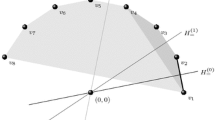Abstract
In this paper we extend recent results of Fiorini et al. on the extension complexity of the cut polytope and related polyhedra. We first describe a lifting argument to show exponential extension complexity for a number of NP-complete problems including subset-sum and three dimensional matching. We then obtain a relationship between the extension complexity of the cut polytope of a graph and that of its graph minors. Using this we are able to show exponential extension complexity for the cut polytope of a large number of graphs, including those used in quantum information and suspensions of cubic planar graphs.



Similar content being viewed by others
Notes
The set \(E\) is sometimes not specified explicitly when \(E\) is clear from the context or the choice of \(E\) does not make any difference.
Even though an extension can also be a polyhedron and not necessarily a polytope, we will consider only those extensions that are polytopes. It is not difficult to see that for a polytope the extension with smallest size would indeed be a polytope.
References
Avis, D., Imai, H., Ito, T., Sasaki, Y.: Two-party bell inequalities derived from combinatorics via triangular elimination. J. Phys. A Math. Gen. 38(50), 10971–10987 (2005)
Avis, D., Imai, H., Ito, T.: Generating facets for the cut polytope of a graph by triangular elimination. Math. Program. 112(2), 303–325 (2008)
Barahona, F.: The max-cut problem on graphs not contractible to \({K}_{5}\). Oper. Res. Lett. 2(3), 107–111 (1983). ISSN 0167–6377
Bell, J.S.: On the Einstein–Podolsky–Rosen paradox. Physics 1(3), 195–290 (1964)
Corman, T.H., Leiserson, C. E., Rivest, R. L.: Introduction to Algorithms. MIT Press, Cambridge, MA (2009). ISBN 0-262-03141-8
de Wolf, R.: Nondeterministic quantum query and communication complexities. SICOMP. SIAM J. Comput. 32, 681–699 (2003)
Deza, M.M., Laurent, M.: Geometry of Cuts and Metrics, Volume 15 of Algorithms and Combinatorics. Springer, Berlin (1997)
Fiorini, S., Massar, S., Pokutta, S., Tiwary, H.R., de Wolf, R.: Linear vs. semidefinite extended formulations: exponential separation and strong lower bounds. In: STOC, pp. 95–106 (2012)
Garey, M.R., Johnson, D.S.: Computers and Intractability: A Guide to the Theory of NP-Completeness. W.H. Freeman, San Francisco, CA (1979)
Garey, M.R., Johnson, D.S., Stockmeyer, L.J.: Some simplified NP-complete graph problems. Theor. Comput. Sci. 1, 237–267 (1976)
Karp, R.M.: Reducibility among combinatorial problems. In: Miller, R.E., Thatcher, J.W. (eds.) Complexity of Computer Computations, pp. 85–103. Plenum Press, New York (1972)
Pokutta, S., Vyve, M.V.: A note on the extension complexity of the knapsack polytope. Optimization Online (2013)
Razborov, A.A.: On the distributional complexity of disjointness. Theor. Comput. Sci. 106(2), 385–390 (1992)
Yannakakis, M.: Expressing combinatorial optimization problems by linear programs. J. Comput. Syst. Sci. 43(3), 441–466 (1991)
Ziegler, G.M.: Lectures on Polytopes, Volume 152 of Graduate Texts in Mathematics. Springer, Berlin (1995)
Acknowledgments
Research of the first author is supported by the NSERC and JSPS. The second author was supported by FNRS, Belgium as a postdoctoral researcher during this research.
Author information
Authors and Affiliations
Corresponding author
Electronic supplementary material
Below is the link to the electronic supplementary material.
Rights and permissions
About this article
Cite this article
Avis, D., Tiwary, H.R. On the extension complexity of combinatorial polytopes. Math. Program. 153, 95–115 (2015). https://doi.org/10.1007/s10107-014-0764-2
Received:
Accepted:
Published:
Issue Date:
DOI: https://doi.org/10.1007/s10107-014-0764-2




